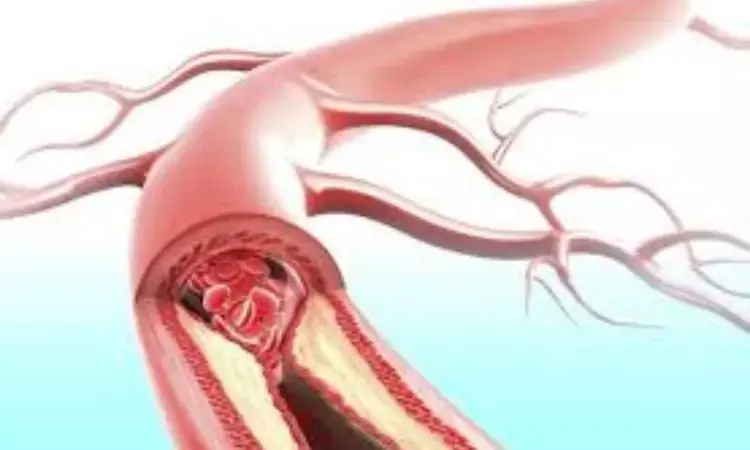- Home
- Medical news & Guidelines
- Anesthesiology
- Cardiology and CTVS
- Critical Care
- Dentistry
- Dermatology
- Diabetes and Endocrinology
- ENT
- Gastroenterology
- Medicine
- Nephrology
- Neurology
- Obstretics-Gynaecology
- Oncology
- Ophthalmology
- Orthopaedics
- Pediatrics-Neonatology
- Psychiatry
- Pulmonology
- Radiology
- Surgery
- Urology
- Laboratory Medicine
- Diet
- Nursing
- Paramedical
- Physiotherapy
- Health news
- Fact Check
- Bone Health Fact Check
- Brain Health Fact Check
- Cancer Related Fact Check
- Child Care Fact Check
- Dental and oral health fact check
- Diabetes and metabolic health fact check
- Diet and Nutrition Fact Check
- Eye and ENT Care Fact Check
- Fitness fact check
- Gut health fact check
- Heart health fact check
- Kidney health fact check
- Medical education fact check
- Men's health fact check
- Respiratory fact check
- Skin and hair care fact check
- Vaccine and Immunization fact check
- Women's health fact check
- AYUSH
- State News
- Andaman and Nicobar Islands
- Andhra Pradesh
- Arunachal Pradesh
- Assam
- Bihar
- Chandigarh
- Chattisgarh
- Dadra and Nagar Haveli
- Daman and Diu
- Delhi
- Goa
- Gujarat
- Haryana
- Himachal Pradesh
- Jammu & Kashmir
- Jharkhand
- Karnataka
- Kerala
- Ladakh
- Lakshadweep
- Madhya Pradesh
- Maharashtra
- Manipur
- Meghalaya
- Mizoram
- Nagaland
- Odisha
- Puducherry
- Punjab
- Rajasthan
- Sikkim
- Tamil Nadu
- Telangana
- Tripura
- Uttar Pradesh
- Uttrakhand
- West Bengal
- Medical Education
- Industry
Alternative LDL Cholesterol safely and effectively lowers risk of ASCVD instead of high intensity statins: JAMA

An alternative low-density lipoprotein (LDL) cholesterol-lowering strategy can successfully reduce the risk of atherosclerotic cardiovascular diseases (ASCVD) instead of high-intensity statins due to the additional benefits of decreased diabetic risk and statin tolerance, as per the results published in the journal JAMA Cardiology.
For high-risk patients with atherosclerotic cardiovascular disease (ASCVD), intensive lowering of low-density lipoprotein (LDL) cholesterol levels is advised. High-intensity statins are the recommended first-line treatment for such conditions. However, high-intensity statins can have some side effects and lead to poor long-term adherence. The previous literature suggested a combination of moderate-intensity statin with LDL cholesterol-lowering drugs to reduce the side effects and improve tolerance. Most of the previous research has explored the impact of such a combination on preventing adverse cardiovascular events. As there is limited research on the effects of LDL cholesterol-lowering drugs on effectiveness and safety, researchers conducted a systematic review and meta-analysis on the long-term efficacy and safety of an alternative LDL cholesterol–lowering strategy vs. high-intensity statin strategy in patients with ASCVD in randomized clinical trials.
A literature search was carried out from databases like PubMed, Embase, and other websites (ClinicalTrials.gov, European Society of Cardiology, tctMD) to include randomized clinical trials comparing an alternative LDL cholesterol–lowering strategy vs. a high-intensity statin strategy in patients with ASCVD, with the presence of cardiovascular events as endpoints. Many studies were filtered, and two trials were deemed eligible. They were the RACING trial and the LODESTAR trial. The moderate-intensity statin with ezetimibe combination therapy in the RACING trial and the treat-to-target strategy in the LODESTAR trial were classified as alternative LDL cholesterol-lowering strategies. The primary endpoint was to assess a 3-year composite of all-cause death, myocardial infarction, stroke, or coronary revascularization, while the secondary endpoints comprised clinical efficacy and safety endpoints.
Findings:
- About 8180 patients with ASCVD, with a mean [SD] age of 64.5 [9.8] years, were analyzed.
- There were 2182 [26.7%] female and 5998 males [73.3%]) in the study.
- No difference was observed in the primary endpoint rate between the alternative strategy and high-intensity statin strategy groups (7.5% vs 7.7%).
- The mean (SD) LDL cholesterol level during treatment was 64.8 (19.0) mg/dL in the alternative strategy group and 68.5 (20.7) mg/dL in the high-intensity statin strategy group (P < .001).
- However, the alternative strategy group had a lower rate of new-onset diabetes (10.2% vs 11.9%).
- The initiation of antidiabetic medication for new-onset diabetes was slow (6.5% vs 8.2%).
- The intolerance-related discontinuation or dose reduction of assigned therapy was also less (4.0% vs 6.7%).
Thus, the study concluded that an alternative LDL cholesterol-lowering strategy has a comparable efficacy regarding mortality or adverse cardiovascular events in ASCVD patients. Additionally, it also exhibited a reduction in LDL cholesterol levels and risk for new-onset diabetes and intolerance.
Further reading: Lee Y, Hong B, Yun KH, et al. Alternative LDL Cholesterol–Lowering Strategy vs High-Intensity Statins in Atherosclerotic Cardiovascular Disease: A Systematic Review and Individual Patient Data Meta-Analysis. JAMA Cardiol. Published online November 20, 2024. doi:10.1001/jamacardio.2024.3911
BDS, MDS
Dr.Niharika Harsha B (BDS,MDS) completed her BDS from Govt Dental College, Hyderabad and MDS from Dr.NTR University of health sciences(Now Kaloji Rao University). She has 4 years of private dental practice and worked for 2 years as Consultant Oral Radiologist at a Dental Imaging Centre in Hyderabad. She worked as Research Assistant and scientific writer in the development of Oral Anti cancer screening device with her seniors. She has a deep intriguing wish in writing highly engaging, captivating and informative medical content for a wider audience. She can be contacted at editorial@medicaldialogues.in.
Dr Kamal Kant Kohli-MBBS, DTCD- a chest specialist with more than 30 years of practice and a flair for writing clinical articles, Dr Kamal Kant Kohli joined Medical Dialogues as a Chief Editor of Medical News. Besides writing articles, as an editor, he proofreads and verifies all the medical content published on Medical Dialogues including those coming from journals, studies,medical conferences,guidelines etc. Email: drkohli@medicaldialogues.in. Contact no. 011-43720751




